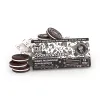Arthritis, a common degenerative condition, isn't exclusive to humans—it also affects our beloved canine companions. As our furry friends age, the prevalence of arthritis increases, leading to discomfort, pain, and a reduced quality of life. The joy of a simple walk or playful romp can diminish as joint stiffness and inflammation take hold.
In the quest to enhance the well-being of our canine companions, a growing interest has emerged in the potential benefits of CBD—a natural compound derived from the cannabis plant.
While the notion might raise eyebrows, it's crucial to distinguish CBD from its psychoactive counterpart, THC. CBD, or cannabidiol, is non-psychoactive and has gained attention for its potential to offer relief from various ailments without inducing a "high."
This article delves into the world of using CBD as a potential avenue to alleviate the symptoms of arthritis in dogs. With CBD's popularity on the rise, many pet owners are intrigued by its potential to enhance their furry friends' comfort and mobility.
Join us as we explore the science behind CBD's effects on canine arthritis and consider whether this natural remedy could indeed be a ray of hope for our four-legged companions.

Understanding Arthritis in Dogs
Several factors contribute to the development of arthritis in dogs. Aging is a significant factor, as wear and tear on joints accumulate over time. Larger breeds, in particular, are prone to joint issues due to their size and weight.
Additionally, genetics can play a role, with certain breeds being more predisposed to arthritis. Injuries, infections, and conditions like hip dysplasia can also contribute to joint degeneration.
Recognizing and addressing arthritis in dogs is vital for ensuring their comfort and overall quality of life. Just like in humans, untreated arthritis can lead to chronic pain, decreased mobility, and a diminished enthusiasm for daily activities.
Our furry friends deserve a life free from constant discomfort, where they can enjoy walks, playtime, and a cozy spot to rest.
By understanding the signs of arthritis and seeking appropriate treatments, we can help our dogs lead happier, more active lives. While conventional treatments like pain medications and joint supplements are common, the emerging interest in CBD offers a potential alternative worth exploring.
In the next sections, we'll delve into the science behind CBD and its potential to provide relief for dogs suffering from arthritis.
CBD and Its Potential Benefits for Dogs with Arthritis
At the heart of CBD's effects lies its interaction with the endocannabinoid system (ECS), a complex network found in the bodies of mammals, including dogs. The ECS plays a crucial role in maintaining balance and homeostasis within the body.
It's composed of receptors, notably CB1 and CB2 receptors, which are found throughout various tissues and organs, including the immune and nervous systems.
When introduced to a dog's ECS, CBD interacts with these receptors, potentially influencing various physiological processes. For dogs with arthritis, this interaction holds promise for addressing some of the most pressing symptoms associated with the condition.
The Potential Benefits of CBD for Dogs with Arthritis
-
Pain Relief: One of the most sought-after benefits of CBD is its potential to alleviate pain. By interacting with CB1 receptors in the nervous system, CBD may modulate pain signals, providing dogs with arthritis a measure of relief from discomfort.
-
Inflammation Reduction: CBD's interaction with CB2 receptors, primarily found in immune cells, suggests an anti-inflammatory effect. By dampening inflammatory responses, CBD could help ease the swelling that contributes to joint pain and stiffness.
-
Improved Mobility: Arthritis often impedes a dog's mobility due to joint stiffness and discomfort. By addressing pain and inflammation, CBD could potentially help dogs move more freely and engage in activities they've been missing out on.
-
Enhanced Quality of Life: The combined effects of pain relief, reduced inflammation, and improved mobility can contribute to an overall enhancement of a dog's quality of life. Activities that once caused discomfort might become enjoyable again, allowing dogs to maintain their vitality even as they age.
While anecdotal reports from pet owners are encouraging, scientific research on CBD's effects on dogs with arthritis is still evolving. Promising studies have shown improvements in comfort and mobility, but more comprehensive research is needed to provide a clearer understanding of CBD's mechanisms and its potential as a therapeutic option.
As with any treatment, consulting with a veterinarian before incorporating CBD into a dog's routine is crucial to ensure safety and appropriate dosing. In the next section, we'll address some common misconceptions about CBD and provide guidance on making informed decisions for your canine companion's well-being.

How CBD May Alleviate Arthritis Symptoms
CBD's potential to alleviate arthritis symptoms lies in its multifaceted interactions within the endocannabinoid system (ECS) and its broader effects on pain and inflammation regulation. Let's delve into how CBD's properties may contribute to managing the discomfort of arthritis in dogs.
CBD's most notable attribute is its anti-inflammatory potential. Inflammation is a hallmark of arthritis, contributing to joint pain and mobility issues. By interacting with CB2 receptors in immune cells, CBD may help modulate inflammatory responses.
This interaction can lead to a reduction in the production of pro-inflammatory molecules, easing the swelling that exacerbates arthritis symptoms.
CBD's influence on CB1 and CB2 receptors extends beyond just pain and inflammation modulation. In the ECS, these receptors play a role in maintaining balance and harmony within the body.
By interacting with these receptors, CBD can help regulate various physiological processes, including immune responses and hormone release. This broader modulation can contribute to an overall improvement in a dog's comfort and mobility.
As research into CBD's effects on dogs with arthritis continues to evolve, the potential for a natural, non-pharmacological option to alleviate discomfort and improve mobility is an exciting prospect.
By making informed decisions and prioritizing your dog's health, you can explore how CBD might contribute to a happier, more comfortable life for your four-legged companion.
Choosing the Right CBD Product
When it comes to managing arthritis in dogs with CBD, a variety of product types are available, each offering unique benefits. From tinctures and treats to topicals, pet owners have options to consider.
Let's explore these product types and discuss important factors to keep in mind when selecting the right CBD product for your canine companion.
|
CBD Product Type |
Description |
Considerations |
|---|---|---|
|
Tinctures |
Liquid form administered via dropper. Offers precise dosage control. Can be mixed with food or treats. |
|
|
Treats |
CBD-infused treats with appealing flavors for easy administration. |
|
|
Topicals |
CBD balms or creams applied directly to affected areas. Provides localized relief. |
|
|
Factors to Consider |
Description |
Guidance |
|
Potency |
Varies among products. Consider the severity of arthritis symptoms and consult a vet for dosage advice. |
|
|
Quality |
Choose products made from high-quality, organic hemp. Look for third-party testing for purity and accurate labeling. |
|
|
Full-Spectrum vs. Isolate |
Full-spectrum products contain multiple cannabinoids for potential synergistic effects. Isolates contain pure CBD. |
|
|
Administration Method |
Consider your dog's preferences and comfort. Impact on onset and duration of effects. |
|
It's important to note that while CBD shows promise in managing arthritis symptoms, it should complement—not replace—other approaches to care. Regular veterinary visits, tailored pain management strategies, and lifestyle adjustments remain integral to your dog's overall well-being.
In the journey to alleviate arthritis discomfort in your four-legged friend, collaboration between you, your veterinarian, and the right CBD product can pave the way for a happier, more mobile life.

Administering CBD for Arthritis
Administering CBD to dogs with arthritis requires a thoughtful and methodical approach. Prior to incorporating CBD into your pet's routine, consulting a veterinarian is crucial. Their expertise can provide tailored recommendations based on your dog's specific needs, ensuring safety and effectiveness.
When introducing CBD, it's advisable to start with a low dosage. This cautious approach allows you to closely observe your dog's response and make gradual adjustments.
Generally, a starting dosage of around 0.2 to 0.5 mg of CBD per pound of your dog's body weight, administered once or twice daily, can be considered. As you begin, monitor your dog's behavior, mobility, and overall comfort, looking for any signs of improvement or changes.
Consistency is key in CBD administration. Maintaining a regular schedule for dosage helps maintain a stable level of CBD in your dog's system, maximizing its potential benefits. Integrating CBD into your dog's daily routine can be seamless.
You can add CBD oil to their meals or treats, use CBD-infused treats as rewards, or apply CBD topicals during grooming or massage sessions. As you progress, stay attuned to any side effects and be prepared to adjust the dosage as needed based on your dog's response.
Monitoring the Dog's Response
Observing and tracking your dog's response to CBD is essential for gauging its effectiveness in managing arthritis symptoms. By paying close attention to changes in behavior, mobility, and pain levels, you can make informed decisions about dosage adjustments and the overall treatment plan.
As you introduce CBD, observe your dog's behavior for any noticeable shifts. Look for signs of increased comfort, such as improved mobility, decreased stiffness, and a more enthusiastic approach to daily activities. A reduction in behaviors associated with pain, like limping or whimpering, can indicate positive progress.
Positive effects on mobility might become apparent within a few days to a couple of weeks after starting CBD. Keep track of your dog's ability to move around more freely, climb stairs, or engage in play. Gradual improvements in joint flexibility and movement can signify that CBD is making a positive impact.
Remember that each dog's response to CBD is unique, and the timeline for experiencing positive effects can vary. While some dogs might show quick improvements, others might require more time.
Regular communication with your veterinarian and open observation of your dog's response will guide you in optimizing the CBD regimen to best suit your furry friend's needs.
Professional Consultation and Safety
Before embarking on a CBD regimen to manage your dog's arthritis symptoms, seeking professional guidance from a veterinarian is paramount. Your veterinarian's expertise ensures a safe and effective approach that takes into account your dog's unique health profile.
During the consultation, provide your veterinarian with a comprehensive medical history of your dog. This includes any preexisting conditions, ongoing medications, and recent treatments. This information is crucial for assessing how CBD may interact with your dog's current health regimen.
CBD has the potential to interact with certain medications your dog might be taking. By consulting a veterinarian, you can address any concerns about potential interactions and ensure that introducing CBD won't compromise your dog's overall health or the efficacy of other treatments.
While CBD is generally well-tolerated, it's important to be aware of potential side effects. Your veterinarian can discuss common side effects, such as mild drowsiness or changes in appetite, and provide guidance on how to manage them. Professional advice empowers you to navigate any unexpected reactions with confidence.
Complementary Approaches and Lifestyle Changes
While CBD holds promise as a potential relief option for dogs with arthritis, it's important to recognize that a holistic management approach involves more than just introducing CBD. To optimize your dog's comfort and mobility, lifestyle changes and complementary approaches play a pivotal role in their overall well-being.
Maintaining a healthy weight is crucial for dogs with arthritis. Extra weight places added stress on joints, exacerbating discomfort. Consult your veterinarian for guidance on an appropriate diet and portion control to help your dog achieve and maintain an ideal weight.
Consider incorporating joint-supporting supplements, such as glucosamine and chondroitin, into your dog's regimen. These supplements can promote joint health and potentially alleviate some arthritis symptoms. Consult your veterinarian for recommendations tailored to your dog's condition.
CBD can serve as a valuable component of a holistic arthritis management plan, working in tandem with lifestyle adjustments and other strategies.
By collaborating with your veterinarian, you can create a tailored plan that considers your dog's specific needs, ensuring that CBD enhances their quality of life while supporting their overall comfort and mobility.

Enhancing Mobility and Comfort
In the pursuit of enhancing the mobility and comfort of dogs dealing with arthritis, it's crucial to explore a multifaceted approach. Arthritis, a degenerative joint condition, can greatly impact a dog's quality of life.
CBD, a non-psychoactive compound derived from cannabis plants, offers potential benefits in managing arthritis symptoms by interacting with the endocannabinoid system. It shows promise in reducing inflammation, alleviating pain, and improving mobility.
Administering CBD requires careful consideration. Starting with a low dosage and gradually increasing it, while observing changes in behavior, mobility, and pain levels, is recommended. Regular monitoring and consultation with a veterinarian are essential for adjusting the dosage and treatment plan effectively.
Discussing your dog's medical history, medications, and potential interactions with a veterinarian ensures a safe and informed approach.
While CBD can play a valuable role, it's important to view it as part of a comprehensive strategy. Lifestyle changes, including weight management, exercise, and joint-supporting supplements, synergize with CBD's potential benefits.
By embracing CBD alongside these strategies and collaborating with a veterinarian, pet owners can contribute to a more comfortable and active life for their beloved dogs struggling with arthritis. Ultimately, this holistic approach aims to enhance the overall well-being of our four-legged companions and provide them with the quality of life they deserve.










